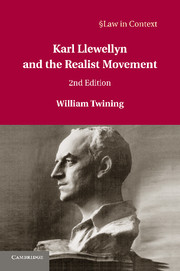Book contents
- Frontmatter
- Contents
- Foreword
- Preface
- Postscript
- Acknowledgements
- Abbreviations
- Part I The Rise of the Realist Movement 1870–1931
- Part II The Life and Work of Karl Llewellyn: A Case Study
- 6 The Man
- 7 Two Early Works
- 8 The Cheyenne Way
- 9 Law in Our Society
- 10 The Common Law Tradition
- 11 The Genesis of the Uniform Commercial Code
- 12 The Jurisprudence of the Uniform Commercial Code
- 13 Miscellaneous Writings
- 14 The Significance of Llewellyn: An Assessment
- Part III Conclusion
- Appendices
11 - The Genesis of the Uniform Commercial Code
from Part II - The Life and Work of Karl Llewellyn: A Case Study
Published online by Cambridge University Press: 05 December 2012
- Frontmatter
- Contents
- Foreword
- Preface
- Postscript
- Acknowledgements
- Abbreviations
- Part I The Rise of the Realist Movement 1870–1931
- Part II The Life and Work of Karl Llewellyn: A Case Study
- 6 The Man
- 7 Two Early Works
- 8 The Cheyenne Way
- 9 Law in Our Society
- 10 The Common Law Tradition
- 11 The Genesis of the Uniform Commercial Code
- 12 The Jurisprudence of the Uniform Commercial Code
- 13 Miscellaneous Writings
- 14 The Significance of Llewellyn: An Assessment
- Part III Conclusion
- Appendices
Summary
INTRODUCTION
The Uniform Commercial Code is the product of one of the most ambitious legislative ventures of modern times. The ig6s Official Text with comments fills a substantial volume of 731 pages. The Code contains over four hundred sections, divided into ten articles, and covers most, but not all, of the extensive field of commercial law. Between July 1953 and July 1966 the Code was enacted in fifty-one jurisdictions. By the end of 1969 only one American State, Louisiana, had held back.
In its brief life the Code has generated a vast literature. There is a quarterly journal devoted entirely to it. A bibliography published in 1966 ran to 176 pages and listed over fourteen hundred items; the compiler of the 1969 edition of the same bibliography noted that ‘the past two years have produced over 500 law review articles as well as over 100 books and pamphlets devoted exclusively to the Code’. This flood of literature shows no signs of abating.
Where so many experts have rushed in, an outsider is tempted to emulate the angels. However, in a study of Llewellyn the Uniform Commercial Code cannot be ignored: over a period of fifteen years (1937–52) he devoted a major part of his energies to it and his contribution represents one of his greatest achievements. The full story of his participation could well be the subject of a book in itself. The present study is concerned with Llewellyn's contributions to commercial law only in so far as they have a direct bearing on his juristic ideas.
- Type
- Chapter
- Information
- Karl Llewellyn and the Realist Movement , pp. 270 - 301Publisher: Cambridge University PressPrint publication year: 2012



